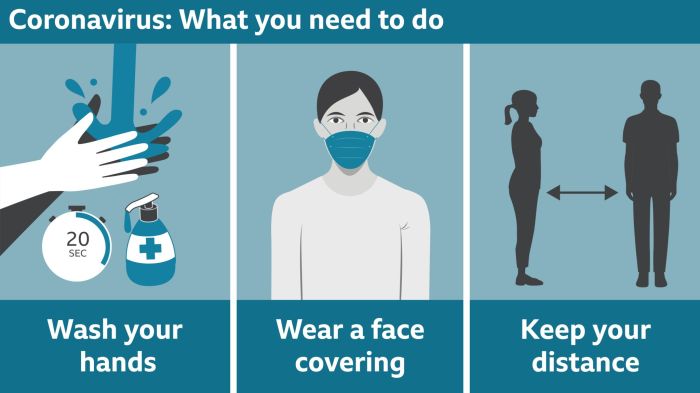In the wake of the pandemic, establishing effective health routines has become more crucial than ever. This guide delves into the importance of post-pandemic health practices, exploring how they can enhance overall well-being and lead to long-term benefits. Join us on this journey towards a healthier future.
Importance of Post-Pandemic Health Routines
Establishing health routines after the pandemic is crucial for maintaining overall well-being and ensuring a healthy future. The impact of the pandemic on our physical and mental health has been significant, making it essential to prioritize our health now more than ever.
Consistent Health Routines for Improved Well-Being
Consistency in health routines can lead to improved overall well-being by promoting healthy habits and lifestyle choices. By incorporating regular exercise, balanced nutrition, and adequate rest into our daily routines, we can boost our immune system, increase energy levels, and reduce the risk of chronic diseases.
Long-Term Benefits of Post-Pandemic Health Practices
Maintaining post-pandemic health practices offers long-term benefits that can positively impact our quality of life. By staying committed to healthy habits, such as regular physical activity, proper hydration, and stress management techniques, we can enhance our resilience, improve mental clarity, and increase longevity.
Physical Exercise and Fitness Regimens

Regular physical exercise is crucial for post-pandemic recovery, as it not only helps in improving physical health but also plays a significant role in boosting immunity and mental well-being. Here are some types of exercises suitable for individuals looking to restart their fitness routines:
Low-Impact Workouts
Low-impact exercises are ideal for those who are easing back into fitness after a period of inactivity. These workouts are gentle on the joints and muscles while still providing a good workout. Examples of low-impact exercises include:
- Walking or brisk walking
- Swimming or water aerobics
- Cycling or using a stationary bike
- Yoga or Pilates
- Tai Chi or Qi Gong
Boosting Immunity and Mental Health
Physical activity has been shown to boost the immune system by promoting healthy circulation and reducing inflammation in the body. Regular exercise also helps in managing stress and improving mental health by releasing endorphins, the feel-good hormones. Incorporating a mix of cardiovascular, strength training, and flexibility exercises into your routine can help in achieving overall well-being post-pandemic.
Diet and Nutrition Guidelines
After a period of limited activity during the pandemic, it's crucial to focus on healthy eating habits to support post-pandemic recovery. A balanced diet plan along with proper hydration can play a significant role in improving overall health and well-being.
Healthy Eating Habits
Creating a balanced diet plan after periods of limited activity involves incorporating a variety of nutrient-dense foods. Here are some tips to help you get started:
- Include a good mix of fruits, vegetables, whole grains, lean proteins, and healthy fats in your meals.
- Avoid processed foods high in sugar, salt, and unhealthy fats.
- Try to cook meals at home more often to have better control over ingredients and portion sizes.
- Limit the intake of sugary beverages and opt for water or herbal teas instead.
Importance of Hydration
Hydration plays a crucial role in overall health, especially after a period of limited physical activity
- Water helps regulate body temperature, aids in digestion, and supports nutrient absorption.
- Dehydration can lead to fatigue, headaches, and poor concentration.
- Drink water throughout the day and listen to your body's signals for thirst.
- Consider incorporating hydrating foods like fruits and vegetables with high water content into your diet.
Mental Well-being Practices

In the wake of the pandemic, it's crucial to prioritize mental well-being alongside physical health to ensure a holistic recovery. Implementing mindfulness techniques and strategies can significantly reduce stress and anxiety levels, promoting overall wellness post-pandemic.
Mindfulness Techniques to Reduce Stress and Anxiety
- Practice deep breathing exercises to calm the mind and body.
- Engage in meditation sessions to cultivate a sense of inner peace and clarity.
- Stay present in the moment by focusing on your surroundings and sensations.
- Try yoga or tai chi to improve flexibility, balance, and mental well-being.
Connection Between Mental Health and Physical Well-being
There is a strong correlation between mental health and physical well-being, as they both influence each other. Engaging in regular physical exercise can release endorphins, which are known to improve mood and reduce feelings of stress and anxiety.
Strategies for Maintaining a Positive Mindset
- Practice gratitude by reflecting on things you are thankful for each day.
- Surround yourself with positive influences and supportive individuals.
- Set realistic goals and celebrate small victories along the way.
- Avoid negative self-talk and practice self-compassion and forgiveness.
Ultimate Conclusion
As we conclude our exploration of post-pandemic health routines, it's clear that prioritizing our well-being is key to navigating the new normal. By incorporating these practices into our daily lives, we can strive for a healthier and happier future ahead.
Helpful Answers
How important are post-pandemic health routines?
Establishing post-pandemic health routines is crucial for maintaining physical and mental well-being in the long term, especially after the challenges posed by the pandemic.
What types of exercises are ideal for post-pandemic recovery?
Low-impact workouts, such as yoga and walking, are great options for individuals restarting their fitness routines post-pandemic.
How can mindfulness techniques help reduce post-pandemic stress and anxiety?
Practicing mindfulness can improve mental well-being by promoting relaxation, reducing stress levels, and enhancing overall resilience.














